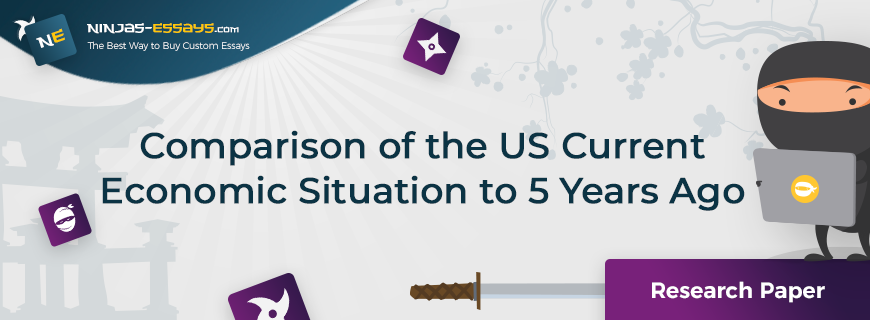
Comparison of the US Current Economic Situation to 5 Years Ago
While analyzing the current economic situation in the US in comparison to (5) years ago, it is important to look at certain facts about this economy. United States has one of the largest economies in the world. $15.7 trillion was estimated as the nominal GDP of the US in 2012.United States has maintained a GDP growth rate of 2.2%. The major trading partners of the US include Germany, China, Canada, Mexico, and Japan. The average per capita GDP is estimated at $49,601 (2012). The United States is the second world largest trading nation and the second largest producer of natural gas. United States is also the third largest world producer of oil (United States, Fiscal Year, 2013).
While analyzing the US economy in relation to unemployment, the factors that affect unemployment in the US include: demographics, education level, global competition, and automation. These factors affect unemployment through a number of ways: the number of workers employed, wages levels, rate of work, and duration of unemployment. It is important to note that US has tried to maintain the employment rate, and it was in 2008 (global economic crisis) when the States lost almost nine million jobs. Unemployment in US only falls during economic prosperity periods and rises during recessions. As a result, the social safety net cost duly increases as tax revenue drops. During election periods, the major debates provided solutions, through which job creation rate could be improved. The 2012 election provided channels for job creation. Most debates focused on unemployment and how to create employment. The unemployment rate is currently upheld at 7.7%, and is anticipated to go down if the Government’s commitment to job creation is realized (US Government, 2013).
The interest rate affects the public and private sectors. Any fluctuation in the interest rate has either positive or negative effect on the economy. When interest rates, for example, increase, borrowing of money in the banks become too expensive; hence, consumer demand is dampened as the prices for estates, loans, and mortgages hike. The Federal Reserve Bank of the United States plays a major role in money circulation. The Reserve Bank dictates money circulation and interest rate. The Reserve Bank also controls the rate of inflation in the US. In 2008, when the country was hit by a global crisis, the lending rates in banks were increased to counter the change (US International Trade Commission, 2013).
Strategies to be Implemented by the Federal Government
Certain strategies can be implemented by the Federal Government, and, as a result, more employment opportunities would be created. These strategies include the following suggestions. The government should establish investment credit for every taxpaying citizen. A citizen paying tax of approximately $1000 per year would be empowered if the money is invested in a mutual fund, New York Stock Exchange, or any business that is bound to make good returns. Minimum amount of time should then be set by statute before the money is withdrawn. The government then should encourage entrepreneurship and provide technical advice for the creation of new business by the citizens. The only protocols that should be put in place is that employed citizens (by this business) pay tax fully. Only Americans should be employed in these businesses. The next strategy is that the government should provide incentives for companies so as to keep workers on the payroll at reduced working rates. This would ensure that more people are employed in the job sector.
Antitrust Policies Used by the Government
Antitrust policies are just a collection of policies or laws by the Federal and the State government. The laws control how business corporations conduct and organize their affairs. The objective of these laws is to ensure fair competition for the advantage of the local consumer. In United States v Socony-Vacuum Oil Co of 1940, the court condemned the refiners efforts to purchase ‘distress’ gasoline that was produced independently. The court also emphasized that the price fixing agreement was a crime (Olivares & Kokkoris, 2010). The court proved that unlawful agreement could be subject to severe punishment by law. If the monopoly had succeeded, then the public investors would easily control and manipulate the economy. Inflation would become uncontrollable by the government.
Customers who should Receive Discounts
The principle that dictates equality in competition suggests that all consumers have the right to equal treatment in the market, whoever wants to engage in economic activities is allowed. Undertakings that are not sufficient enough to compete with other undertakings successfully should be forced to leave the market. Equality in competition does not mean that those who are weaker and smaller should be protected. Since equal treatment is the guiding principle of competition, this equality law can also be applied to customers; competitive customer deserves incentives as per the principle of equality in competition law. The most active customer who is always willing to participate in forums that are aimed at improving the business can be considered as a competitive customer. Such customers are always willing to help in identifying problems in the market and offering solutions .While giving incentives, the participation can be assessed on the frequency and level of contribution (Dabbah, 2007). Good customers who deserve incentives are those that provide benefits to goods for the cost that is required to purchase or obtain them (Vitale, 2006).
Monopoly
Monopoly may be efficient in an economy where the government has put up laws that govern competition, or where there are set standard for competition. This approach would promote growth in the market as the products are engaged in a competitive manner. Monopoly may also be inefficient where the monopolist believes that the customer has no option but to purchase the product he sells. In this case, the monopolist may cheapen the cost of production and increase the price. If this happens, the burden is left on the consumer. Monopoly may be efficient if a company lowers its price for a genuine competition; if this happens, it is the customer who benefits.



